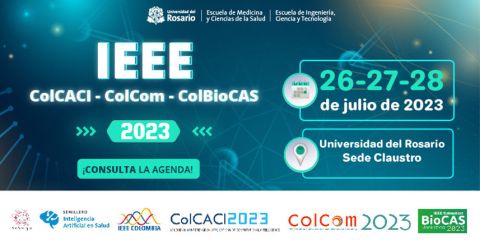
IEEE ColBioCAS 2023, IEEE ColCACI 2023, IEEE ColCom 2023
Colombian Conference on Applications of Computational Intelligence – ColCACI 2023
https://2023.ieee-colcaci.org/
Colombian Conference on Communications and Computing - ColCom 2023
https://2023.ieee-colcom.org/
Colombian BioCAS Workshop – ColBioCAS 2023
https://ewh.ieee.org/r9/colombia/emb/ColBioCAS2023.html
Tienen como objetivo presentar el progreso y el desarrollo del uso académico, científico e industrial de las tecnologías de la ingeniería y la bioingeniería para monitorear, controlar y ayudar a los sistemas biológicos, los ecosistemas, los cultivos y el cuerpo humano, con el uso de sistemas de comunicaciones, computación y la inteligencia artificial.
Los eventos mencionados con conferencias que se llevan a cabo anualmente en el país, se realizarán este año en la Sede Claustro de la Universidad del Rosario.
Actividades
- Tutoriales en temas específicos de la ingeniería relacionados a biomédica, inteligencia artificial, comunicaciones, computación y circuitos y sistemas.
- Conferencias internacionales.
- Ponencias de trabajos en las áreas del congreso.
- Eventos sociales.
Lecturers

Alvaro Joffre Uribe Quevedo
Ver más

Alvaro Joffre Uribe Quevedo
Abstract: Immersive and makerspace technologies are gaining momentum as suitable tools in the health sciences domain. Whether for teaching, training, or health care, these technologies are presenting opportunities for complementing traditional techniques. While these technologies allow creating and recreating scenarios otherwise impossible in real life, their current democratization is enabling research and development into creating novel and engaging forms of training and health care applications. This presentation provides an overview of current trends and opportunities pertaining to the use of immersive and makerspace technologies in medical training and health care, presenting some use cases associated with the use of virtual and augmented reality and 3D printing in procedures such as an eye examination, the cricothyroidotomy, breastfeeding, exergames, and reminiscence therapy.
Short bio
Alvaro Joffre Uribe Quevedo is an Assistant Professor in the Faculty of Business and Information Technology at Ontario Tech University in Oshawa, Ontario, Canada, where he teaches courses associated with immersive technologies, computer graphics, and game engines in the Game Development and Interactive Media Undergraduate program. He also teaches immersive technology courses in the Computer Science graduate programs and conducts research in Virtual Reality and Human-Computer Interactions. Recent projects include understanding the usability effects of physical and physiological measurements in VR in various use cases including VR locomotion, radiation attenuation training, breastfeeding, reminiscence therapy, laparoscopy simulation, twin-twin transfusion syndrome simulation, and inclusive design for VR collaboration rooms, among others. Dr. Uribe Quevedo received his bachelor's degree in Mechatronics Engineering from Universidad Militar Nueva Granada in Bogotá, Colombia, in 2003. In 2008, Dr. Uribe Quevedo completed his Master’s in Mechanical Engineering, and in 2011 his Doctoral degree in the same field at the Universidade Estadual de Campinas in Campinas, São Paulo, Brazil. In 2015 he became a Post-Doctoral fellow at the Games Institute at the University of Waterloo in Waterloo, ON, Canada, researching the effects of games in medical training as part of the IMMERSe network jointly working with Ontario Tech University.

Alberto Delgado
Ver más

Alberto Delgado
Abstract: Following Unesco recommendation on education, this talk is an introductory presentation of artificial intelligence and its current applications. From control theory problems to human data, parametric models can be trained for predictions and categorization. Nonetheless, there is a huge difference when AI is applied to people and this requires ethical principles and regulation.
Short Bio: Alberto Delgado, Engineer (BEng) and Master (M Eng) in Electrical Engineering, Universidad de los Andes. PhD in Cybernetics (intelligent control), Reading University (UK). Full Professor, National University of Colombia. Currently, teaching at the Automation Program the courses, "Humans and Intelligent Machines," and "Intelligent Control."

Stephen Wong
Ver más

Stephen Wong
Abstract: The healthcare industry today is under siege to address growing macroeconomic and socioeconomic challenges including high costs and low quality, increasing federal regulations, patient expectations, health inequities, and provider consolidation. For example, healthcare waste alone constitutes 25-30% or about US $1 trillion of the annual healthcare spending in the United States. To increase efficiency and accessibility, artificial intelligence (AI) has recently been used in automating business, administrative, billing, and scheduling processes in eliminating mundane, repetitive tasks performed by humans. But can we use AI to address the clinical tasks that often involve interpreting large amounts of multimodal patient data and require clinicians’ cognitive capabilities to perform non-routine tasks and to enhance human decision-making performance - or even beat the clinicians’ performance? This presentation describes two clinical use cases on investigating, applying, and implementing cognitive automation in reducing unnecessary biopsies of breast cancer due to overdiagnosis and improving e-triage, detection, and diagnosis of Stroke developed and validated at Houston Methodist. We adopted a multi-modal AI strategy and designed the solutions to fit into existing clinical workflow. We also hope to engage a meaningful conversation on the possibility of cognitive automation in medicine. If cognitive automation is successful in medicine, it begs the question that what would be the future role of physicians and the patient-physician relationship and patient experience?
Short-Bio: With three decades of research, product development, and executive leadership experience in industry and academia, Dr. Stephen Wong’s many achievements include leading teams that: automated the first VLSI DRAM chip production (Bell Labs), created the nation's first hospital-integrated picture archiving communication system (UCSF), implemented the largest radiology information system in Europe (Philips Healthcare), produced the largest web trading platform (Charles Schwab), pioneered high content screening and analysis for drug discovery (Harvard), and developed new computational approaches for image-guided therapy and digital medicine (Houston Methodist). Currently he is the John S. Dunn, Sr. Presidential Distinguished Endowed Chair, the Founding Chair of Systems Medicine and Bioengineering Department, the T.T. and W.F. Chao Center for BRAIN, and Translational Biophotonics Laboratory at Houston Methodist Research Institute; Associate Director, Houston Methodist Neal Cancer Center; Chief of Medical Physics, Houston Methodist Hospital; and Professor of Radiology, Neurosciences, Pathology and Laboratory Medicine, Cornell University. Wong received his Ph.D. in Computer Science from Lehigh University and senior executive education from Stanford University, MIT, and Columbia University. He is a Fellow of IEEE, AIMBE, AMIA, and AAIA, and a licensed professional engineer. He has lived in and continues to work across various continents--including North America, Europe, Asia, and Australia/Oceania.
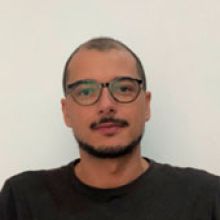
Pablo Pérez-Nicoli
Ver más

Pablo Pérez-Nicoli
Abstract: The underlying principles of wireless power transfer (WPT) were first discovered and developed during the nineteenth century. Nevertheless, despite the remarkable contributions made by scientists and technologists like Nikola Tesla, its practical implementation in our daily lives remained limited until recently. In the field of active implantable medical devices (AIMDs), while there were earlier precedents of using WPT in the mid-20th century, the broader utilization of this technology gained significant traction in the 21st century.
WPT alleviates the trade-off between battery size and lifespan, which are critical design considerations in AIMDs. Within this application, the key design considerations revolve around extending the transmission distance and increasing the transmitted power, while ensuring compliance with safety regulations.
In this presentation, we will explore the fundamental aspects and ongoing design challenges associated with WPT links for biomedical applications. We will delve into the involved circuits and magnetic links, approaching the topic from a comprehensive system-level perspective.
Short-Bio: Pablo Pérez-Nicoli received his bachelor's degree in electrical engineering in 2013 and the Ph.D. degree in 2018 from the Universidad de la República, Montevideo, Uruguay. He joined the Electrical Engineering Department of the same university in 2012, where he currently holds the position of Assistant Professor. His research endeavors revolve around wireless power transmission and the design of ultra-low-power analog integrated circuits. He has made contributions to the field, authoring numerous papers and a book titled "Inductive Links for Wireless Power Transfer: Fundamental Concepts for Designing High-efficiency Wireless Power Transfer Links," which was published in 2021 by Springer.
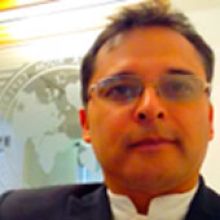
Ignacio Castillo
Ver más

Ignacio Castillo
Abstract: For the evolution of commercial Internet, the Internet 2 in all the world, known as Advanced Networks or National Research and Education Networks (NREN) look for the evolution of the next generation Internet developing protocols and letting those huge international projects be a result of an intense international collaborations. The advanced network infrastructure is installed and managed directly by ISP companies but coordinated by regional consortiums formed by universities and research centers. This talk also shows the state of regional advanced networks infrastructure including the interplanetary Internet and the state of the research for the advanced networks in the world.
Short-Bio: Ignacio Castillo has been working for 27 years in telecommunications and computer industry and academia in 110 national and international projects, as team member or leader on technical and management positions in internet networks, data centers and engineering management. His interest: Internet networks, Datacenters & Eng. management.
In industry he worked for DICI, IFE, REDUNO-TELMEX and DATACENTER DYNAMICS, being now an independent consultant.
In academia he is a full-time professor-researcher at Autonomous University of Mexico City (UACM) since 2008 being Head of the Advanced Networking Laboratory. He was full time at UPAEP and UTM, and he was visiting professor or p time at UPS Ecuador, UDEFA (Military), UAM and BUAP.
He wrote 4 books, and 50 journal and conference papers (SCOPUS h-8 index). He has lectured 140 undergraduate & graduate courses. His ADVNETLAB team developed the software UTILCON. He received 20 international and national awards and distinctions, such as: IEEE ANDESCON Best paper award 2022 and 2020, IEEE Computer Society BoG member and IEEE Senior Member.
He was an IEEE Computer Society Distinguished Lecturer (2015-2017), till today, he offered 171 keynotes, invited talks and webinars, and 16 tutorials for conferences. He is volunteer for IEEE Communications Society and Computer Society. He received his bachelor’s degree in sciences degree in Electronic Sciences and his M.Sc. Degree in Electronic Devices, both from the B. Autonomous University of Puebla, Mexico.
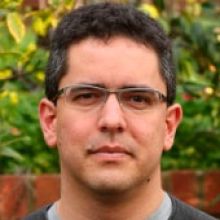
Fernando Pérez's
Ver más

Fernando Pérez's
Short-Bio: Fernando Pérez's research focuses on creating tools for modern computational research and data science across domain disciplines, with an emphasis on high-level languages, interactive and literate computing, and reproducible research. Through tools like IPython and Project Jupyter, he builds foundational blocks that enable scientists to tackle all stages of computational research (from exploration through publication) with a coherent approach, thus improving scientific productivity, collaboration and reproducibility.
Tutorials
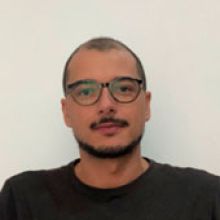
Pablo Pérez-Nicoli
Ver más

Pablo Pérez-Nicoli
Abstract: This tutorial aims to equip the audience with a comprehensive understanding of the fundamentals, design principles, and optimization techniques in the rapidly evolving field of Wireless Power Transfer (WPT), with a specific focus on biomedical applications. The tutorial transitions from theoretical foundations to practical aspects, providing participants with a hands-on learning experience. A standout feature of this tutorial is the opportunity for participants to directly explore and apply the presented concepts using calculation scripts and electrical simulations with the provided LTspice schematics. This tutorial is based on the book: “Inductive Links for Wireless Power Transfer: Fundamental concepts for designing high-efficiency WPT links” by the speaker, recently published in 2021 (Springer). Join us in this enlightening session to gain practical insights and delve into the exciting world of wireless power transfer for AIMDs.
Short-Bio: Pablo Pérez-Nicoli received his bachelor's degree in electrical engineering in 2013 and the Ph.D. degree in 2018 from the Universidad de la República, Montevideo, Uruguay. He joined the Electrical Engineering Department of the same university in 2012, where he currently holds the position of Assistant Professor. His research endeavors revolve around wireless power transmission and the design of ultra-low-power analog integrated circuits. He has made contributions to the field, authoring numerous papers and a book titled "Inductive Links for Wireless Power Transfer: Fundamental Concepts for Designing High-efficiency Wireless Power Transfer Links," which was published in 2021 by Springer.
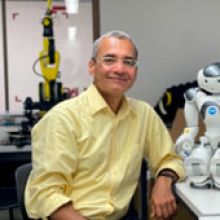
Jesus Alfonso López Sotelo
Ver más

Jesus Alfonso López Sotelo
Edge AI (Edge Artificial Intelligence) is an emerging technology that brings the power of data processing and machine learning to edge devices, such as smartphones, sensors, cameras, and other IoT devices. The ability to process and analyze data at the edge can significantly improve the efficiency and accuracy of many applications, such as machine fault detection, traffic monitoring, crop monitoring, and more.
One of the main advantages of Edge AI is that it allows decisions to be made in real-time, without the need to send data to the cloud for processing. This reduces latency and bandwidth consumption, which can be critical in applications where response time is of the essence.
In this mini-course we will make an introduction to Edge Artificial Intelligence, we will learn about some tools that allow us to develop with this technology, and we will also implement the use of an AI model in an edge device specifically from Tiny ML, such as an ESP 32 or an ESP
Short-Bio: Born in Cali, Colombia. He is an Electrical Engineer, Master in Automation and PhD in Engineering. He has more than 25 years of experience in teaching and developing projects related to Artificial Intelligence. His areas of interest are artificial neural networks and deep learning, edge AI, fuzzy systems, evolutionary computing, teaching artificial intelligence and the impact that this technology can have on our society. He is an Associate Researcher of the national system of science technology and innovation in Colombia of MinCiencias. He is a professional member of the IEEE where he is the president of the national chapter of the Computational Intelligence Society. He is currently linked to the Universidad Autónoma de Occidente in Cali and belongs to the Energy Research Group, GIEN. He has published various articles, book chapters, and books on the topics of Artificial Neural Networks, Deep Learning, and other artificial intelligence techniques.
Publications in international conferences, in national conferences and other bibliographic production: https://scholar.google.com/citations?hl=en&user=7PIjh_MAAAAJ&
Linkedin profile: https://www.linkedin.com/in/jesus-alfonso-lópez-sotelo-76100718/
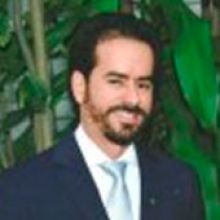
Sergio Armando Gutiérrez
Ver más

Sergio Armando Gutiérrez
In this tutorial we will explore the basic principles of the concept of Programmable Data Planes, and how this concept extends and increases the evolution landscape of Software Defined Networks (SDN). We will discuss the advantages and potential of programmable data planes and how they integrate with the current definition of SDN. We will also introduce the P4 Programming language, which is the current approach for the development and implementation of programmable data planes. Additionally, we will present the step-by-step configuration of a basic laboratory environment that will allow acquiring the skills for the development of applications and solutions based on P4, which can later be extended to implement novel functionalities within data networks.
Short-Bio: Sergio Armando Gutiérrez is a Systems Engineer, Master in Systems Engineering and PhD in Engineering - Systems and Informatics from the University of San Buenaventura and the National University of Colombia - Medellín Campus, respectively. He was a postdoctoral researcher in the area of network security for critical infrastructures in the electricity sector in the Applied Telecommunications Research Group of the University of Antioquia. He is currently a professor and researcher in the Department of Electronic Engineering and Telecommunications at the same university. His research interests include software-defined networks, programmable data planes, and the application of artificial intelligence techniques in different domains of telecommunication networks.
